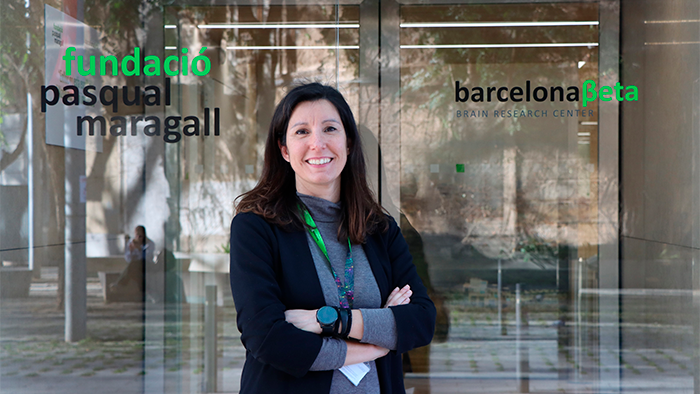28 Apr | 2025
Dr. Sandra Acosta leads a new research group at the Barcelonaβeta Brain Research Center to study alzheimer’s progression

Dr. Sandra Acosta, new group leader of the BBRC
The research center of the Pasqual Maragall Foundation, the Barcelonaβeta Brain Research Center (BBRC), is expanding its scientific activity with the creation of a new Research Group in Brain Disorders Models, led by Dr. Sandra Acosta. This new team aims to develop advanced cellular models to study the mechanisms involved in diseases like Alzheimer’s and to advance toward new therapeutic strategies.
With this addition, the BBRC now has six specialized research groups focused on key areas such as risk factors, neuroimaging, fluid biomarkers, genomics, and the biology of aging.
According to the World Health Organization, more than 55 million people currently live with dementia worldwide, with Alzheimer’s being the most common cause. This number is steadily rising due to population aging, making these diseases one of today’s greatest scientific and social challenges.
The new group will focus on the development and application of advanced cellular models, such as brain organoids derived from induced pluripotent stem cells (iPSCs), which allow key neurodegenerative processes to be studied in the lab. These three-dimensional cellular models replicate, on a small scale, the structure and function of the human brain, enabling detailed observation of crucial processes such as neuroinflammation, toxic protein accumulation, and cell death. This innovative approach will facilitate the identification of new therapeutic strategies and biomarkers for early Alzheimer’s diagnosis.
“It is an honor to join the BBRC team and lead this new research group. Our goal is to use advanced cellular models to better understand the mechanisms underlying neurodegenerative diseases like Alzheimer’s, with the hope of identifying new therapeutic strategies,” says Dr. Acosta.
Sandra Acosta, who holds a Ph.D. in Molecular and Cellular Biology from the University of Barcelona, has built a strong international career at prestigious institutions such as the Université Libre de Bruxelles and Northwestern University. Her multidisciplinary approach combines developmental biology, functional genomics, and artificial intelligence, and she has been a pioneer in developing new tools applied to the study of brain organoids to unravel the mechanisms underlying neurological disorders. She is currently a Serra-Húnter professor at the Bellvitge School of Medicine (UB), leads the Functional Neurogenomics Group, and collaborates with the Sant Joan de Déu Research Institute.
The group she will lead at BBRC will also promote the development of a personalized medicine platform, which will integrate biological and clinical data to predict disease progression and tailor treatments to each patient. This research line will also help identify therapeutic windows and safely assess experimental drugs.
Expanding new research lines
Dr. Acosta’s group joins a well-established research ecosystem at BBRC, which until now has consisted of five specialized research teams focused on studying Alzheimer’s and neurodegenerative diseases through a unique impact on prevention, early detection, and treatment. With this addition, the center strengthens its commitment to translational research, aimed at transferring advances from the lab to clinical practice. This new line complements BBRC’s ongoing work on the study of the preclinical phase of Alzheimer’s—a silent but critical period in which brain alterations occur even before the first symptoms appear. Detecting these changes early is key to developing preventive strategies capable of slowing down or even preventing the onset of the disease.









